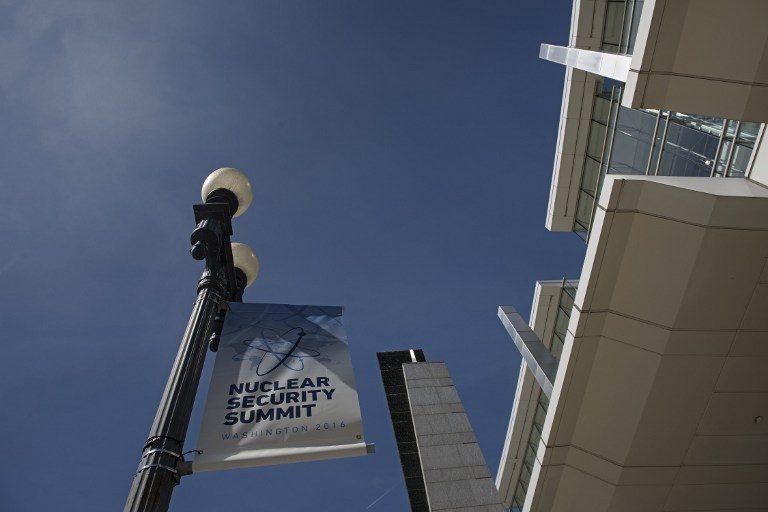SUMMARY
This is AI generated summarization, which may have errors. For context, always refer to the full article.

WASHINGTON DC, USA – North Korea’s nuclear defiance will feature prominently during talks on the first day of a major security summit hosted by President Barack Obama in Washington Thursday, March 31.
Obama will kick off the nuclear security summit by meeting Japanese Prime Minister Shinzo Abe and South Korean President Park Geun-Hye, followed by a separate sit-down with President Xi Jinping of China.
North Korea’s threats following the January detonation of a nuclear device and a long-range rocket launch a month later, are expected to feature prominently in both meetings.
The White House wants to keep up pressure on the North Korean regime, increasing the economic and diplomatic cost of ignoring international appeals to mothball its nukes.
Obama, Abe and Park are likely to call for the rigorous implementation of recently agreed sanctions against North Korea and discuss the possible deployment of US missile defense systems in the region.
The United States and South Korea have begun discussions on deployment of THAAD – the Theater High Altitude Area Defense System, a sophisticated missile system.
“I think the 3 leaders will clearly demonstrate their unity in our commitment and our firm resolve to deter and defend against North Korean aggression,” said Dan Kritenbrink, a top Obama advisor on Asia.
Obama will later meet, Xi, his only full bilateral meeting with the dozens of world leaders coming to Washington.
Obama will also hold what the White House is calling a “brief” meeting with France’s President Francois Hollande.
China is seen as key to making sanctions against North Korea bite.
“We’ve seen China step up in many ways in terms of applying pressure,” said Obama foreign policy aide Ben Rhodes, praising the passage of UN sanctions.
But Washington believes that China could more forcefully wield its influence over Pyongyang, including encouraging its Stalinist neighbor to tone down destabilizing rhetoric.
Tensions are only expected to rise in advance of a major Communist Party Congress in North Korea in May.
China also has its own concerns about the deployment of THAAD so close to its own territory, fearing it may weaken Chinese capabilities and deepen US influence in the region.
And Obama and Xi are also likely to touch on disputes in the South China Sea, where Beijing has seized contested territory.
Washington fears the islets and atolls may be used for military purposes.
US officials see a steady series of meetings and exchanges between Obama and Xi as vital in limiting disagreements.
“This is where problems get solved and decisions get made,” said Kritenbrink.
Obama and Xi are expected to meet again at the G20 in China in September.
Dirty bomb
The specter of the Islamic State (ISIS) group obtaining a “dirty bomb” will also loom over the summit, which is the fourth of its kind.
The White House had seen the meetings as elevating the problem of shaky nuclear safeguards from the desks of technocrats to the highest corridors of power.
The meeting comes just days after 32 people were killed and 340 were injured in bombings at Brussels airport and the Belgian capital’s metro.
The attacks featured conventional explosives, but two of the suicide bombers – Ibrahim and Khalid El Bakraoui – have been linked to possible efforts by the Islamic State (IS) group to secure fissile material.
Late last year, Belgian police investigating the November 13 Paris terror attacks found 10 hours of video surveillance detailing the comings and goings of a senior Belgian nuclear official.
Belgian media have since reported that the brothers were linked to the surveillance.
“Having a portion of the discussion that is focused on counter-ISIL is a decision that was made in January,” said Laura Holgate, the National Security Council’s senior director for weapons of mass destruction, terrorism and threat reduction. “But it turns out that it is obviously very timely, unfortunately.
“The video footage is of concern,” she said, adding, with regard to the Belgian case, that the United States does not “have any information that a broader plot exists.”
Few believe ISIS could develop an atomic bomb, but many fear it could acquire uranium or plutonium and construct a “dirty bomb.”
Such a device would not trigger a nuclear explosion but would scatter radioactive material – with potentially devastating physiological, medical and economic effects.
Nuclear material can be found in small quantities at universities, hospitals and other facilities the world over, often not well secured.
Since the mid-1990s, almost 2,800 incidents of illicit trafficking, “unauthorized possession” or loss of nuclear materials have been recorded in an International Atomic Energy Agency database.
The International Panel on Fissile Materials, an independent group of arms-control experts, estimated that the global stockpile of highly enriched uranium stood at around 1370 tonnes at the end of 2014.
Most was held in Russia.
More than fifty heads of state have been invited to attend the summit, but the absence of leaders from Russia, North Korea, Iran and Belarus virtually ensures gaps in the united front.
Rhodes said Russia’s decision not to attend at the highest level was a missed opportunity for Moscow, which itself faces significant threats of its own.
“All they’re doing is isolating themselves in not participating as they have in the past.” – Andrew Beatty, AFP / Rappler.com
Add a comment
How does this make you feel?
There are no comments yet. Add your comment to start the conversation.